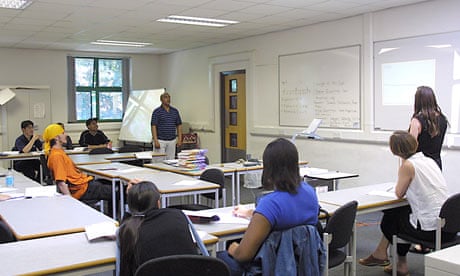I'm 15, I'm from Hebden Bridge and I go to Calder High School, the oldest comprehensive in Yorkshire. Like many other young people, recent events have made me really aware of the effects that political decisions can have on my life.
At the moment, education as we know it is under threat. Despite pledges and promises, tuition fees are trebling and vital schemes such as Sure Start and the educational maintenance allowance (EMA) are being axed. I'd like to stress how important it is that EMA at least is protected.
As I'm sure you all know; EMA is a small weekly payment to students from lower income families and it helps them to afford further education. In the words of Nadine, one of the 650,000 college students who currently receive this allowance: "EMA means I can go to college. Without it I just couldn't manage."
And it's that simple. Whether this money is spent on transport, books or food at lunchtime, it helps students to cope with the costs of college. But the government is scrapping it. Why? The official line, summarised by a government spokesman is: "In these tough economic times we simply do not have the luxury of being able to spend hundreds of millions on a programme that doesn't see results in return for the majority of the money spent."
So the government believes that EMA is a wasteful luxury. I don't agree, and neither do 10 of the UK's leading economists who, in an open letter in the Guardian, urged the chancellor to reconsider his proposal to scrap EMA. They argue that students who receive EMA are more likely to go into higher paid jobs than they would have done without the scheme; and therefore pay more in taxes, claim less in benefits and contribute more to the economy and society.
In this way, EMA pays for itself.
The Institute for Fiscal Studies came to the same conclusion, and after thorough analysis of the scheme stated that "the costs of EMA are completely offset" by its benefits. And yet the government is scrapping it, and setting up a replacement scheme that will cut the money available by £400m. They claim that it will be better targeted. Well, I don't know how nifty Michael Gove thinks he can be with a loaf and some fishes, or even a bus pass and some textbooks, but he'd need nothing short of a miracle to replicate the benefits of EMA with that budget.
I'd just like to return to the words of that government spokesman, who says that EMA is a luxury. Is it a luxury to ensure that all young people – regardless of the amount their parents earn – have access to education after the age of 16? Is it not a duty, a responsibility, a principle that students from poorer families should be entitled to the same educational opportunities as richer students?
I believe that if even one student is unable to continue education based on their families income and not their ability, then the government has failed in its responsibility to uphold basic rights to education. Politicians always seem to talk about how much they value education, how it's a priority, how it's safe in their hands. Well from where I'm standing it doesn't look very safe at all. How is cancelling EMA safeguarding education for 16- to 18-year-olds? And how is trebling university fees ensuring access to higher education?
It's not.
This is why so many of us have taken to the streets in protest to stand up for our right to education.
